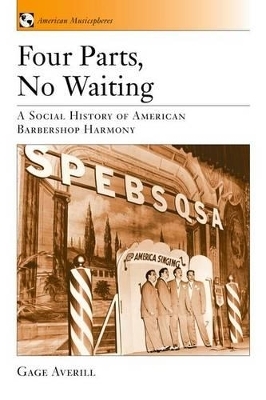
Four Parts, No Waiting
A Social History of American Barbershop Harmony
Seiten
2003
Oxford University Press Inc (Verlag)
978-0-19-511672-4 (ISBN)
Oxford University Press Inc (Verlag)
978-0-19-511672-4 (ISBN)
'Four Parts, No Waiting' investigates the role that vernacular, barbershop-style close harmony has played in American musical history, in American life, and in the American imagination.
Four Parts, No Waiting investigates the role that vernacular, barbershop-style close harmony has played in American musical history, in American life, and in the American imagination. Starting with a discussion of the first craze for Austrian four-part close harmony in the 1830s, Averill traces the popularity of this musical form in minstrel shows, black recreational singing, vaudeville, early recordings, and in the barbershop revival of the 1930s. In his exploration of barbershop, Averill uncovers a rich musical tradition--a hybrid of black and white cultural forms, practiced by amateurs, and part of a mythologized vision of small-town American life. This engagingly-written, often funny book critiques the nostalgic myths (especially racial myths) that have surrounded the barbershop revival, but also celebrates the civic-minded, participatory spirit of barbershop harmony. The text is accompanied by an audio CD.
Four Parts, No Waiting investigates the role that vernacular, barbershop-style close harmony has played in American musical history, in American life, and in the American imagination. Starting with a discussion of the first craze for Austrian four-part close harmony in the 1830s, Averill traces the popularity of this musical form in minstrel shows, black recreational singing, vaudeville, early recordings, and in the barbershop revival of the 1930s. In his exploration of barbershop, Averill uncovers a rich musical tradition--a hybrid of black and white cultural forms, practiced by amateurs, and part of a mythologized vision of small-town American life. This engagingly-written, often funny book critiques the nostalgic myths (especially racial myths) that have surrounded the barbershop revival, but also celebrates the civic-minded, participatory spirit of barbershop harmony. The text is accompanied by an audio CD.
Gage Averill is Professor of Ethnomusicology and Chair of the Music Department at New York University.
Preface: "I Don't Know Why (I love You Like I Do)" ; Introduction: Past Perfect ; 1. "A Little Close Harmony": A medley of nineteenth-century harmony ; 2. The "golden era": Quartets, show business, & the music industry ; 3. The lost chords: The early barbershop revival ; 4. On Main Street, U.S.A. ; 5. Romancing the Tone: Song, sound & significance in barbershop harmony ; Conclusion Afterglow
| Erscheint lt. Verlag | 3.4.2003 |
|---|---|
| Reihe/Serie | American Musicspheres |
| Zusatzinfo | 9 line illus & 16 halftones |
| Verlagsort | New York |
| Sprache | englisch |
| Maße | 241 x 165 mm |
| Gewicht | 526 g |
| Themenwelt | Kunst / Musik / Theater ► Musik |
| Geisteswissenschaften ► Geschichte ► Regional- / Ländergeschichte | |
| Sozialwissenschaften ► Soziologie | |
| ISBN-10 | 0-19-511672-0 / 0195116720 |
| ISBN-13 | 978-0-19-511672-4 / 9780195116724 |
| Zustand | Neuware |
| Haben Sie eine Frage zum Produkt? |
Mehr entdecken
aus dem Bereich
aus dem Bereich
Erinnerungen
Buch | Softcover (2024)
Pantheon (Verlag)
16,00 €
Universalgelehrter, Polarreisender, Entdecker
Buch | Hardcover (2024)
mareverlag
28,00 €


